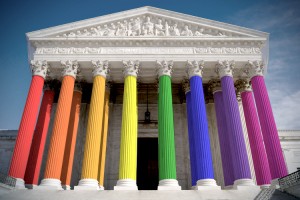 Thursday evening, Grove City College in Pennsylvania, one of our country’s foremost conservative colleges, hosted a debate over the future of freedom and the conservative movement. The event featured two folks that, for all intents and purposes, I’d have expected to be on the same side of the ledger: Matt Kibbe from FreedomWorks and Marvin Olasky from World Magazine. Instead of sharing the stage over their common interests, these two men were there to discuss their different views of the conservative movement.
Thursday evening, Grove City College in Pennsylvania, one of our country’s foremost conservative colleges, hosted a debate over the future of freedom and the conservative movement. The event featured two folks that, for all intents and purposes, I’d have expected to be on the same side of the ledger: Matt Kibbe from FreedomWorks and Marvin Olasky from World Magazine. Instead of sharing the stage over their common interests, these two men were there to discuss their different views of the conservative movement.
At a time in the life of our nation where liberty is at stake, it’s hardly appropriate for believers in human freedom to subdivide themselves one against another with “fiscal” or “social” conservative labels. Those who do truly miss the point we find ourselves in history – the very moment we should be unifying ourselves and embracing a higher purpose and vision.
To that end, I’m prepared to announce that I no longer consider myself primarily a social or a fiscal conservative but, instead, that I’m a ‘cultural conservative.’
This is not simply a new way of styling the conservative mantle, but instead it is an overriding philosophical theme that should be understood to be all-encompassing, for limited government and freedom should be the aim of all conservatives, not just a few factions within the conservative movement.
We, the united conservatives of the United States ought to take a thorough look at liberty, and the cultural and economic preconditions necessary to its survival. This requires a reaffirmation of the republican (not in the party sense) principle that the rule of law ensures the natural, God-given rights of all people, are fundamentally represented as life, liberty and the pursuit of happiness (property).
The protection of these rights requires a consistent ethic and approach to governance and human nature. All elements of life, from economic choices to family decisions are of an inherently moral nature.
Spending more than you take in embodies the concept of covetousness, and is inherently immoral.
Ending the lives of preborn children in the name of protecting some synthetic right for some, while revoking the truly natural right to life for others, is inherently immoral.
Having a government grow to the point that it stifles students from uniquely learning and developing their own God-given talents and abilities is inherently immoral.
So, in the end, there is no such thing as a social conservative or an economic conservative, there are just those that believe in liberty and those that believe in government largesse.
Liberty is not strictly libertarian, nor will it flourish in moderate statism, for liberty is the product of limited law. The political extremes of anarchy and tyranny are what our founding fathers sought to avoid. They rightly understood that on the one extreme of anarchy, wherein moral relativism abounds and right and wrong are outdated concepts, life, liberty and the pursuit of happiness are not protected.
The misguided notion that there are no consensus values or shared moral concepts will eventually lead to chaos and the ultimate collapse of any great society and economy. On the other extreme, a statist government becomes the arbiter of all things, thus overreaching in the personal lives of private citizens and participating in central planning of the otherwise private economy. This is as dangerous to freedom and free markets as any absence of government could ever be.
Thus, cultural conservatism embraces the time-tested truth that the right amount of government is the recipe for a successful republic. Cultural conservatism might otherwise be called constitutionalism, for it is based strictly off of the ideals enshrined in our founding document. These ideals include the protection of personhood for all people, regardless of race, gender or creed. They include the belief that the rights of man come from God, not from government, which means government does not have the power to give rights or to take rights away. Private property is to be respected, protected and ensured. Constitutionalism is based in moral absolutes, for our founders believed that the God, who gave us life, gave us liberty at the same time. As a result, they also believed that our liberty, which is an extension of our lives, leads to the creation of private property and that, by that connection, property is an extension of a person’s personhood and is also inviolable.
These are concepts that are neither libertarian nor moderately republican, but based on the reality of human nature. Government exists because men and women are fallible, and it is limited because the men and women that are in the government, too, are fallible and must also be restrained. This is an inherently spiritual / philosophical understanding of human nature that ensured the creation of a Constitution based on the reality of the human condition.
For this reason, in America, we have the rule of law as opposed to the rule of men. This ensures that our laws and legal system protect all people equally, as opposed to law becoming the tool of the tyrannical who seek to pervert its intent for their own purposes. Absent this understanding of human nature and how it relates to law and law-giving, our country could never hope to secure the rights of man as granted by the Creator.
In our time, however, we are watching the results of moral relativism unfold before our very eyes. The false notion that human law is the highest authority, and that the voice of the people is the voice of God, is undermining the foundation of freedom. Thus, in order to ensure that we protect life, liberty and property for all, we must embrace a law higher than our own. This is why they founders embraced natural law, which they understood to be God’s revelation, as the foundation of American government.
Therefore, any attempt to redefine our legal tradition in secular-progressive perspective will, inherently, lead to the collapse of our governmental foundation. At the same time, any attempt to secure economic freedom and private property rights absent an adherence to moral absolutes is an exercise in futility.
I call on my fellow conservatives to embrace a consistent, constitutional ethic. Liberty and limited government are the by-products of a society capable of controlling itself. In other words, limited government is contingent on the people’s ability to self-govern, and the ability of any people to self-govern is determined by their dedication to private morality.
There is no such thing as a fiscal or social conservative, because the protection of property is as much a question of morality as the protection of personhood. The concept of a secular free republic is oxymoronic, for there is no republican tradition of limited government under law if there is no consensus moral foundation.
Let’s embrace cultural conservativism, and preserve the most prosperous, powerful and promising nation in the history of mankind.







Thanks for describing your views as a “cultural conservative.” As a Christian who tries to incorporate a Christian worldview in my daily life, and as a fiscally and socially conservative Republican County Council member, I can agree with your explanation of “cultural conservative” as a phrase to summarize who I am as well.
Best wishes! Fred